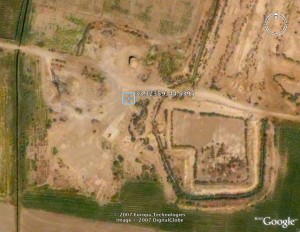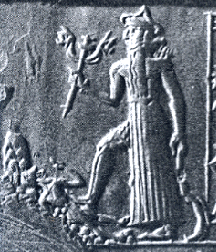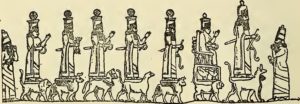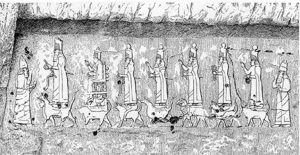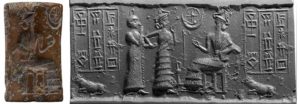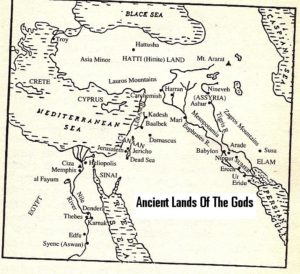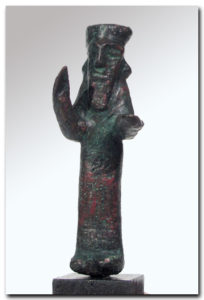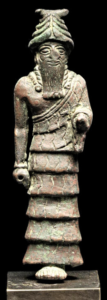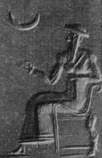Source: Black, J.A., Cunningham, G., Robson, E., and Zólyomi, G.,
The Electronic Text Corpus of Sumerian Literature, Oxford 1998-.
Text 1, a part of the Sumerian creation story; as a literary debate between the bird and the fish in which they argue for their usefulness in the universe as it was then conceived. It has a substantially variant form of the published text, and the end is unpublished. Parts of the text are similar to Genesis 1:20-22.
Fish and Bird, by the command of Enki, Lord of Wisdom, Magick and all crafts, are assigned their positions and instructed in the divine laws. Although Fish laid its eggs in the lagoons and Bird built its nest in the gaps of reed-beds, Bird frightened the Fish of the lagoons by endlessly croaking and squawking. Thus, Fish took a stand against Bird and grandiosely started to talk the other down: noisy, inconvenient to plants, nuisance for the fields, unclean and so forth. Bird replies that Fish is being arrogant, the he smells awful and is deprived of full sight, members to stand up or fly the Heights, and that Fish is prey to Bird.
But Fish is not convinced by the Bird´s speech, and furtively the following day destroys the Bird´s eggs. Both opponents thus fight, and such was the trouble they caused that their litigation was registered in Eridu, and brought to King Shulgi, one of the most famous monarchs of the Third Dynasty of Ur, himself ” a fashioner of words “, a composer, accomplished poet and scribe, builder of temples and roads, a real champion of the gods and the land.
Shulgi issues his judgment in favor of Bird, especially because of the gift of song, i.e ” at Enlil‘s holy table, Bird takes precedence over Fish, … and the Anuna gods rejoice at its voice. It is suitable for banquets in the great dining hall of the gods. It provides good cheer in the king’s palace”. Fish, on the other hand, reigns in the waters of the marshes. Thus, it seems that Bird takes precedence over Fish, therefore meaning most probably the gifts of song and music, the sophistication of palaces and banquets offered to the gods in comparison to the simpler times of the beginnings of civilized life in the villages of South Mesopotamia, when Fish was food for the gods, and “… Just like Ashnan (Nisaba) [the Grain Goddess], it satisfied the hunger of the Land as Her helper.”
(Texts: All Artifacts, Color Coding, & Writings in Bold Type With Italics Inside Parenthesis, are Added by Editor R. Brown, not the Authors, Translators, or Publishers!)
(gods in blue …mixed-breed demigods in teal…)
1-12 In those ancient days, when the good destinies had been decreed,
and after An (Anu) and Enlil had set up the divine rules of heaven and earth,
then the third of them, ……, the lord of broad wisdom,
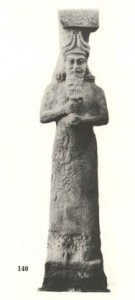 (Enki, Anunnaki King Anu‘s eldest & wisest son, stationed on Earth Colony by father Anu)
(Enki, Anunnaki King Anu‘s eldest & wisest son, stationed on Earth Colony by father Anu)
Enki, the master of destinies, gathered together …… and founded dwelling places;
he took in his hand waters to encourage and create good seed;
he laid out side by side the Tigris and the Euphrates, and caused them to bring water from the mountains;
he scoured out the smaller streams, and positioned the other watercourses.
……
Enki made spacious sheepfolds and cattle-pens, and provided shepherds and herdsmen;
he founded cities and settlements throughout the earth,
and made the black-headed multiply (fashioner of new “modern man” with reproduction capabilities).
He provided them with a king as shepherd, elevating him to sovereignty over them;
the king rose as the daylight over the foreign countries.
13-21 …… Enki knit together the marshlands, making young and old reeds grow there;
he made birds and fish teem in the pools and lagoons ……;
he gave …… all kinds of living creatures as their sustenance,
…… placed them in charge of this abundance of the gods.
When Nudimmud (Enki), august prince, the lord of broad wisdom,
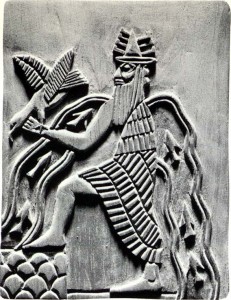 (Enki, DNA Specialist, fashioner of mixed-specie animals, attempting to create workers)
(Enki, DNA Specialist, fashioner of mixed-specie animals, attempting to create workers)
had fashioned ……, he filled the reed-beds and marshes with Fish and Bird,
indicated to them their positions and instructed them in their divine rules.
22-28 Then Fish laid its eggs in the lagoons;
Bird built its nest in a gap in the reed-beds.
But Bird frightened the Fish of the lagoons in its …….
Fish took up a stand and cried out.
Grandiosely it initiated hostilities.
It roused the street by quarreling in an overbearing manner.
Fish addressed Bird murderously:
29-40 “…… Bird, …… there is no insult ……!
Croaking, …… noise in the marshes…… squawking!
Forever gobbling away greedily, while your heart is dripping with evil!
Standing on the plain, you can keep pecking away until they chase you off!
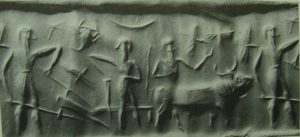 (earthlings working, taught to feed the giant alien gods)
(earthlings working, taught to feed the giant alien gods)
The farmer’s sons lay lines and nets for you in the furrows.
The gardener sets up nets against you in gardens and orchards.
He cannot rest his arm from firing his sling; he cannot sit down because of you.
You cause damage in the vegetable plots; you are a nuisance.
In the damp parts of fields, there are your unpleasing footprints.
Bird, you are shameless: you fill the courtyard with your droppings.
The courtyard sweeper-boy who cleans the house chases after you with ropes.
By your noise the house (1 ms. has instead: palace) is disturbed; your din drives people away.
41-53 “They bring you into the fattening shed.
They let you moo like cattle, bleat like sheep.
They pour out cool water in jugs for you.
They drag you away for the daily sacrifice.
The fowler brings you with bound wings. (1 ms. adds: The fisherman brings you into the palace.)
They tie up your wings and beak.
Your squawking is to no profit; what are you flapping about?
With your ugly voice you frighten the night; no one can sleep soundly.
Bird, get out of the marshes!
Get this noise of yours off my back!
Go out of here into a hole on the rubbish heap: that suits you!”
51-56 Thus Fish insulted Bird on that day.
But Bird, with multicolored plumage and multicolored face,
was convinced of its own beauty, and did not take to heart the insults Fish had cast at it.
As if it was a nursemaid singing a lullaby, it paid no attention to the speech,
despite the ugly words that were being uttered.
Then Bird answered Fish: (1 ms. has instead: It …… insulted Fish; …… said ……: )
57-69 “How has your heart become so arrogant, while you yourself are so lowly?
Your mouth is flabby (?), but although your mouth goes all the way round, you cannot see behind you.
You are bereft of hips, as also of arms, hands and feet — try bending your neck to your feet!
Your smell is awful; you make people throw up, they bare their teeth at you!
No trough would hold the kind of prepared food you eat.
He who has carried you dares not let his hand touch his skin!
In the great marshes and the wide lagoons, I am your persecuting demon.
You cannot eat the sweet plants there, as my voice harasses you.
You cannot travel with confidence in the river, as my storm-cloud covers you.
As you slip through the reed-beds you are always beneath my eyes.
Some of your little ones are destined to be my daily offering; you give them to me to allay my hunger.
Some of your big ones are just as certainly destined for my banqueting hall …… in the mud.
1 line unclear
70-79 “But I am the beautiful and clever Bird!
Fine artistry went into my adornment.
But no skill has been expended on your holy shaping!
Strutting about in the royal palace is my glory; my warbling is considered a decoration in the courtyard.
The sound I produce, in all its sweetness,
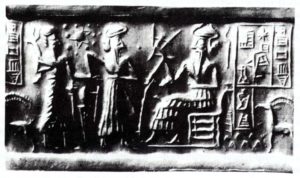 (giant mixed-breed leader is lead by Ninurta, the great-grandfather to Shulgi, to appear before Ninurta‘s father Enlil, holding a plow, tool given by Enlil to worker earthlings; our solar system perfectly depicted in over 5,000 year old artifact)
(giant mixed-breed leader is lead by Ninurta, the great-grandfather to Shulgi, to appear before Ninurta‘s father Enlil, holding a plow, tool given by Enlil to worker earthlings; our solar system perfectly depicted in over 5,000 year old artifact)
is a delight for the person of (King Shulgi) Culgi, son (great-great-grandson) of Enlil.
Fruits and produce of gardens and orchards are the enormous daily offerings due to me.
Groats, flour malt, hulled barley and emmer (?) are sweet things to my mouth.
How do you not recognize my superiority from this?
Bow your neck to the ground!”
80-85 Thus Bird insulted Fish on that occasion.
Fish became angry, and, trusting in its heroic strength and solidness,
swept across the bottom like a heavy rain cloud.
It took up the quarrel.
It did not take to heart the insults that Bird had cast at it.
It could not bring itself to submit, but spoke unrestrainedly.
Again Fish replied to Bird:
86-94 “Chopped-off beak and legs, deformed feet, cleft mouth, thin tongue!
You clatter away in your ignorance, with never any reflection!
Gluttonous, malformed, filling the courtyard with droppings!
The little sweeper-boy sets nets in the house and chases you with ropes.
The baker, the brewer, the porter, all those who live in the house are annoyed with you.
Bird, you have not examined the question of my greatness; you have not taken due account of my nature.
You could not understand my weakness and my strength; yet you spoke inflammatory words.
Once you have really looked into my achievements, you will be greatly humbled.
Your speech contains grave errors; you have not given it due consideration.
95-101 “I am Fish.
I am responsibly charged with providing abundance for the pure shrines.
For the great offerings at the lustrous E-kur (Enlil‘s temple residence in Nippur)
(1 ms. has instead: On the august platform of the great offerings of the gods),
I stand proudly with head raised high!
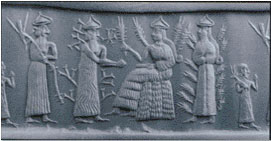
(Enlil, father-in-law Haia, mother-in-law Nisaba, spouse Ninlil, & unidentified earthling)
Just like Acnan (Nisaba, Goddess of Grains) I am here to satisfy the hunger of the Land.
I am her helper.
Therefore people pay attention to me, and they keep their eyes upon me.
As at the harvest festival, they rejoice over me and take care of me.
Bird, whatever great deeds you may have achieved, I will teach you their pretentiousness.
I shall hand back to you in your turn your haughtiness and mendacious speech.”
102-115 Thereupon Fish conceived a plot against Bird.
Silently, furtively, it slithered alongside.
When Bird rose up from her nest to fetch food for her young,
Fish searched for the most discreet of silent places.
It turned her well-built nest of brushwood into a haunted house.
It destroyed her well-built house, and tore down her storeroom.
It smashed the eggs she had laid and threw them into the sea.
Thus Fish struck at Bird, and then fled into the waters.
Then Bird came, lion-faced and with an eagle’s talons,
flapping its wings towards its nest. It stopped in mid-flight.
Like a hurricane whirling in the midst of heaven, it circled in the sky.
Bird, looking about for its nest, spread wide its limbs.
It trampled over the broad plain after its well-built nest of brushwood.
Its voice shrieked into the interior of heaven like the Mistress’s.
116-121 Bird sought for Fish, searching the marshes.
Bird peered into the deep water for Fish, watching closely.
Extending its claws, it just snatched from the water
Fish’s tiny fish-spawn, gathering them all together and piling them up in a heap.
Thus Bird took its revenge and …… its heart.
Again Bird replied to Fish:
122-124 “You utter fool! Dumb, muddle-headed Fish, you are out of ……!
The mouths of those who circle (?) the quay never get enough to eat, and their hunger lasts all day.
Swine, rascal, gorging yourself upon your own excrement, you freak!
125-136 “You are like a watchman living on the walls (?), ……!
Fish, you kindled fire against me, you planted henbane.
In your stupidity you caused devastation; you have spattered your hands with blood!
Your arrogant heart will destroy itself by its own deeds!
But I am Bird, flying in the heavens and walking on the earth.
Wherever I travel to, I am there for the joy of its …… named.
……, o Fish, …… bestowed by the Great Princes.
I am of first-class seed, and my young are first-born young!
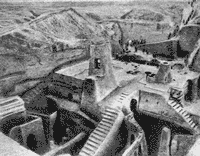
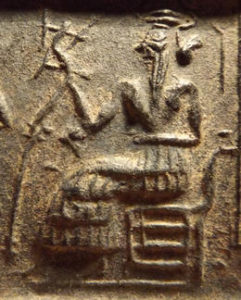 (E-kur, Enlil‘s house on Earth; Enlil, King Anu‘s son & heir)
(E-kur, Enlil‘s house on Earth; Enlil, King Anu‘s son & heir)
…… walks with uplifted head …… to the lustrous E-kur.
…… until distant days.
…… the numerous people say.
How can you not recognize my pre-eminence?
Bow your neck to the ground.”
137-140 Again Bird had hurled insults at Fish.
Then Fish shouted at Bird, eyeing it angrily:
“Do not puff yourself up from your lying mouth!
Our judge shall take this up.
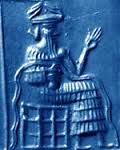
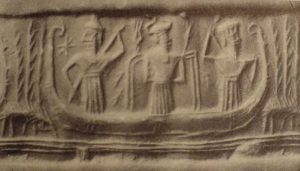
(Enki, God of the Waters, the Abzu marshlands of Persian Gulf; Enki & helpers in the marshes)
Let us take our case to Enki, our judge and adjudicator.”
141-147 And so with the two of them jostling and continuing the evil quarrel in order to establish,
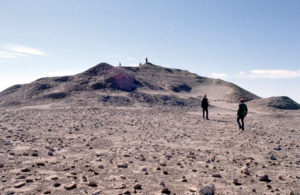 (Eridu ruins with Enki‘s ziggurat residence discovered)
(Eridu ruins with Enki‘s ziggurat residence discovered)
the one over the other, their grandness and pre-eminence, the litigation was registered within Eridug (Eridu),
and they put forward their argumentation (1 ms. has instead: stood there in dispute).
…… thrashing about (?) amid roaring like that of a bull, …… crept forward like …….
They requested a verdict …… from King Culgi (Shulgi), son of Enlil (descendant, great-great-grandson to Enlil).
148-157 (Bird speaks:)
“You ……, lord of true speech, pay attention to my words!
I had put …… and laid eggs there.
…… had bestowed …… and had given as their sustenance.
After …… had started ……, …… he destroyed my house.
He turned my nest of brushwood into a haunted house.
He destroyed my house, and tore down my storeroom.
He smashed my eggs and threw them into the sea.
…… examine what I have said.
Return a verdict in my favor.”
…… investigating……, she prostrated herself to the ground.
158-163…… announced (?) the word.
…… august, spoke from the heart:
“Your words are sterling words, such as delight the heart.”
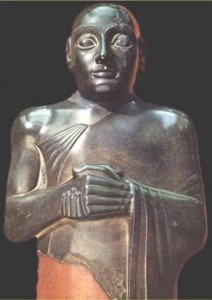 (Shulgi, semi-divine high-priest of Nannar, then selected & protected king of Sumer)
(Shulgi, semi-divine high-priest of Nannar, then selected & protected king of Sumer)
(Culgi speaks:)
“For how long are they (1 ms. has instead: you) going to persist (?) in quarreling?”
Like …… came out supreme.
Like butting ……, they jostled each other.
164-167 (Fish speaks:)
“……, let it be favorable to me!”
(Culgi speaks:)
“I shall instruct you in the divine rules and just ordinances of our dwelling-place.
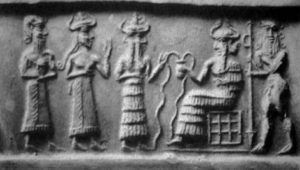
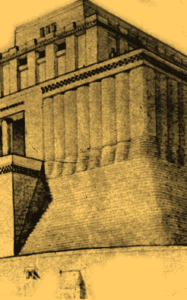 (semi-divine king, Ninhursag, Isimud, & Enki on his throne in Eridu; Enki‘s ziggurat residence in Eridu)
(semi-divine king, Ninhursag, Isimud, & Enki on his throne in Eridu; Enki‘s ziggurat residence in Eridu)
Like (?) Enki, king of the Abzu, I am successful in finding solutions, and am wise in words.
” He answered Bird and Fish:
168-177 “To strut about in the E-kur is a glory for Bird, as its singing is sweet.
At Enlil‘s holy table, Bird …… precedence over you ……!
It shall utter its cries in the temple of the great gods.
The Anuna (Anunnaki) gods rejoice at its voice.
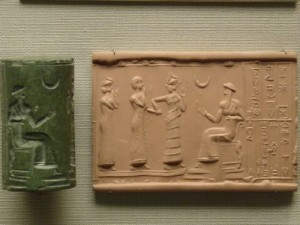
(Nannar Ninsun, her grandson Shulgi, Inanna, Goddess of Love presenting her new spouse Shulgi to Nannar, her father)
It is suitable for banquets in the great dining hall of the gods.
It provides good cheer in the king’s (1 ms. has instead: Culgi‘s) palace.
…… with head high, at the table of Culgi, son (semi-divine descendant-king) of Enlil.
The king …… long life.
1 line fragmentary
Fish …… in splendor …….
178-190 Thereupon Fish …… Bird.
6 lines missing or fragmentary
…… Enki …… bestowed.
1 line fragmentary
In the abzu of Eridug (Eridu) …… Bird …….
Because Bird was victorious over Fish in the dispute between Fish and Bird,
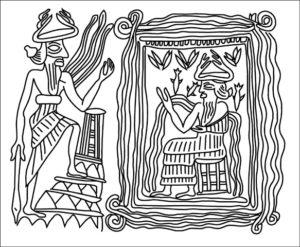
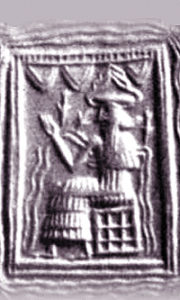 (Ninurta visits Enki; Enki on his throne in Eridu)
(Ninurta visits Enki; Enki on his throne in Eridu)
Father Enki be praised!
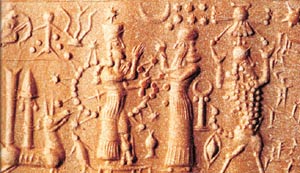 (Inanna & Enlil, many symbols of gods above)
(Inanna & Enlil, many symbols of gods above)(Enheduana is second from left)

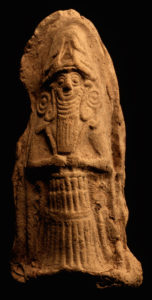
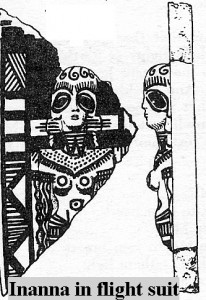
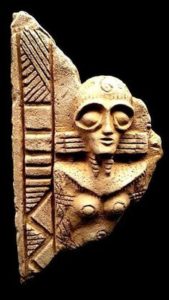
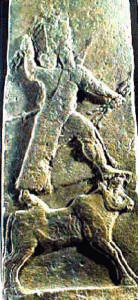
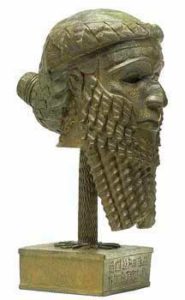
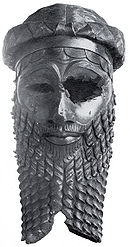
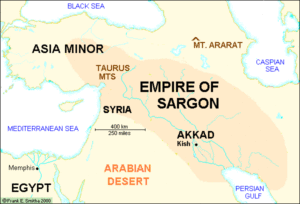
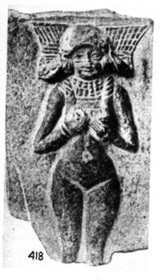
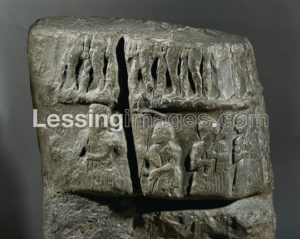
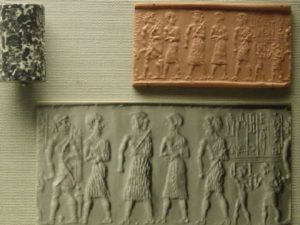
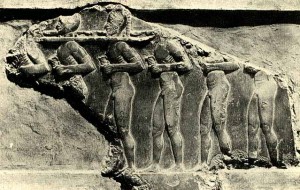
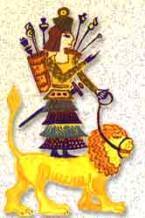
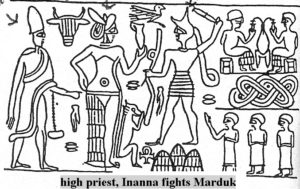
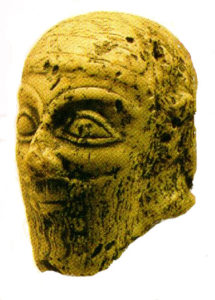
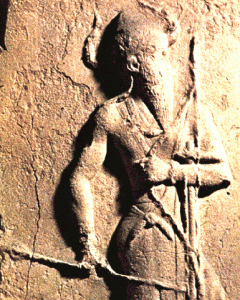
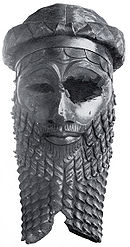
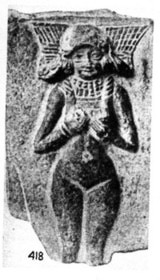
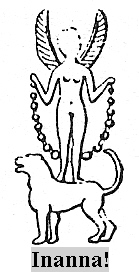
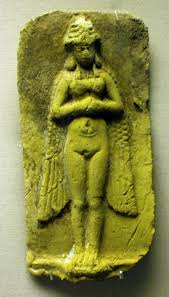
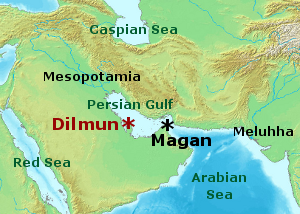
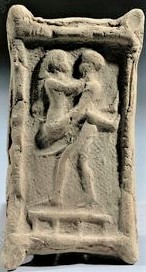
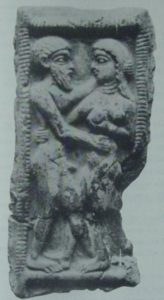
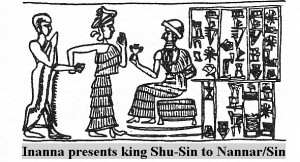
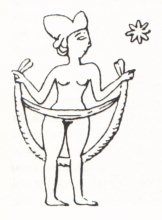
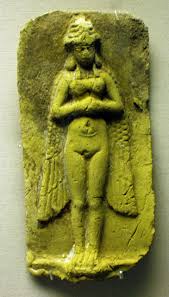
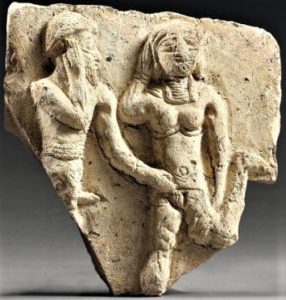
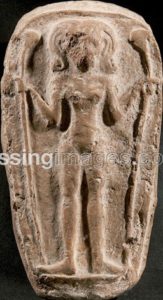
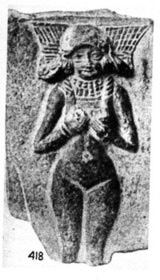
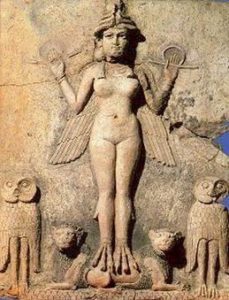
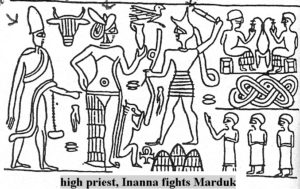
















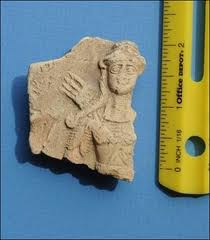
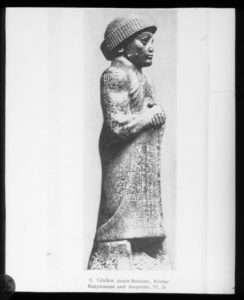
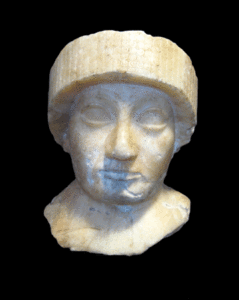
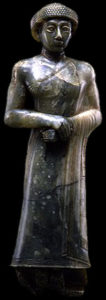
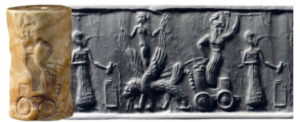
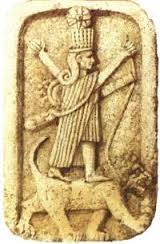
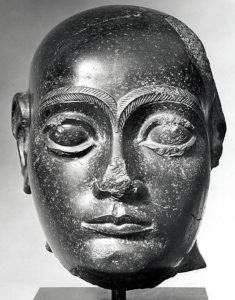
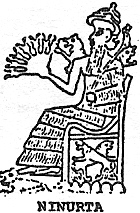
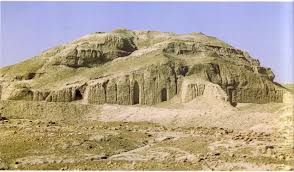
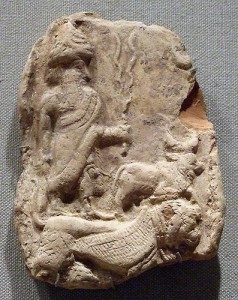
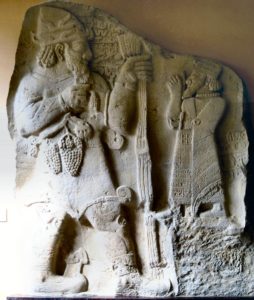
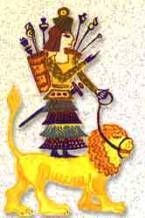
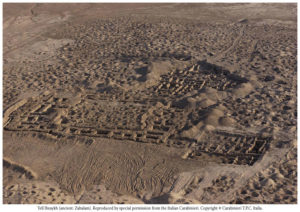
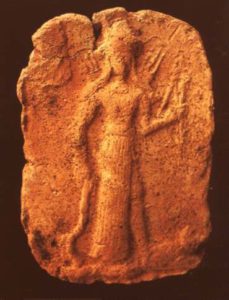
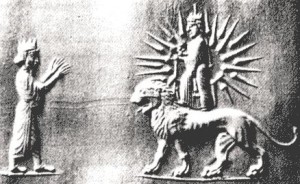
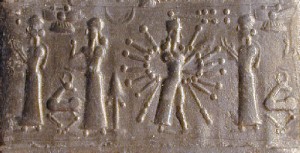
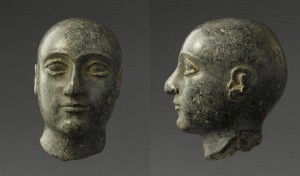
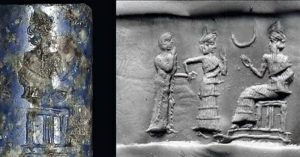
 (
(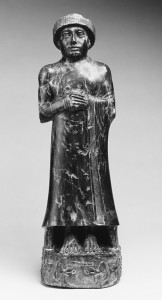
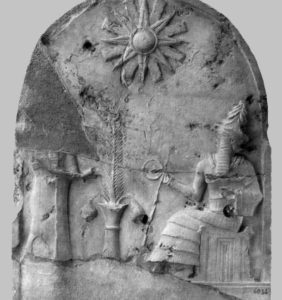
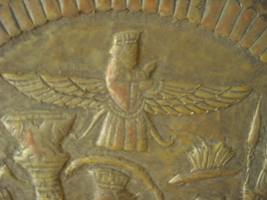
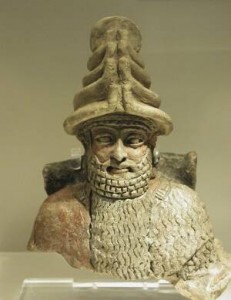
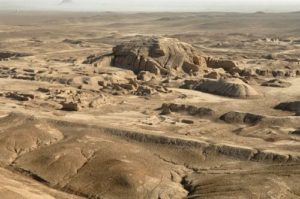 (
(